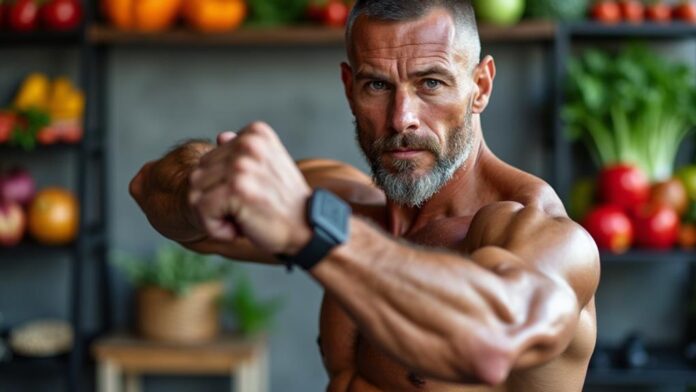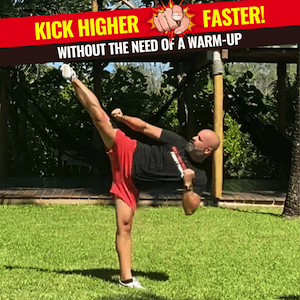As you hit 40, your martial arts performance requires strategic nutrition to stay on top of your game. Even a 2% drop in hydration levels or inadequate carbohydrate intake can greatly impair your training and competition outcomes. You need a balanced diet with the right macronutrient ratio: 60% carbohydrates, 25% fats, and 15% proteins. Focus on complex carbohydrates, lean protein sources, and healthy fats to fuel your energy and recovery. Proper hydration and meal planning are also essential. By fine-tuning your nutrition strategy, you'll be better equipped to optimize your performance – and discover the secrets to success.
Nutrition Fundamentals for Martial Artists
As you hit 40, your martial arts performance may start to decline if you don't adjust your nutrition plan to meet your changing needs. You need to prioritize a balanced diet that supports your energy requirements and muscle recovery.
Carbohydrates are fundamental for martial artists, providing the necessary energy for training and competition. Aim to consume 3-7 grams of carbohydrates per kilogram of body weight daily to maintain adequate glycogen stores.
Protein is also important for muscle repair and recovery. Consume 1.2 to 2.0 grams of protein per kilogram of body weight, with 20-30 grams immediately after training.
Healthy fats, such as those found in avocados, nuts, and olive oil, support overall health and hormone production. Make sure they comprise 20-35% of your total daily caloric intake.
Adequate hydration is also essential, with 2-3 liters of fluid daily necessary to prevent dehydration and maintain focus and endurance.
Macronutrient Balance for Optimal Performance
Beyond age 40, your martial arts performance hinges on finding the right balance of macronutrients to fuel your training and support recovery. To achieve peak performance, you should aim for a macronutrient ratio of 60% carbohydrates, 25% fats, and 15% proteins. This balance provides the necessary energy for intense training sessions and supports recovery.
Your daily carbohydrate intake should be between 3-7 grams per kilogram of body weight to maintain energy levels during training and competition.
As an athlete over 40, your protein needs increase; consume 1.2-2.0 grams of protein per kilogram of body weight daily to support muscle repair and growth. Healthy fats should comprise 20-35% of your total daily calories, focusing on unsaturated sources to support hormone production and overall health.
Achieving this balance is vital for peak performance and recovery. By consuming the right amounts of carbohydrates, proteins, and healthy fats, you'll be able to train at a higher intensity and recover more efficiently.
Make sure to pay attention to your macronutrient ratio to enhance your martial arts performance after 40. This balance will support your energy levels, muscle repair, and overall recovery, helping you perform at your best.
Best Foods for Energy and Recovery
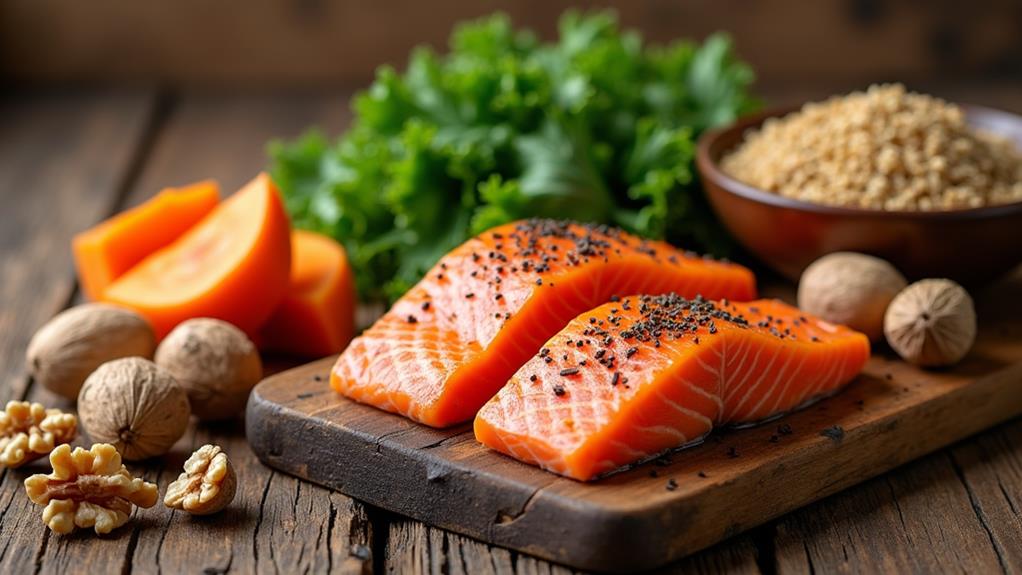
Your diet plays an essential role in fueling your martial arts training and supporting recovery, especially after 40. To enhance your performance, focus on consuming the right foods for energy and recovery.
Complex carbohydrates, such as whole grains, fruits, and vegetables, provide sustained energy for training sessions. Aim for 3-7 grams of carbs per kilogram of body weight daily.
Include lean protein sources like chicken, fish, and legumes to aid muscle repair and growth, with a recommended intake of 1.2-2.0 grams of protein per kilogram of body weight post-training.
Healthy fats from avocados, nuts, and olive oil are vital for sustained energy and hormone production, making up 20-35% of total daily caloric intake.
For ideal recovery, consume a balanced meal containing carbohydrates and protein within 30 minutes post-exercise to replenish glycogen stores and support muscle repair. This helps accelerate the recovery process and supports energy production for your next training session.
Hydration Strategies for Peak Performance
Staying hydrated is essential to releasing your full potential in martial arts training. Adequate hydration maintains your exercise capacity, and even a 2% loss in body weight due to dehydration can impair your performance. To optimize your hydration, aim for a daily fluid intake of 2-3 liters, adjusting based on training intensity and environmental conditions.
| Hydration Status | Urine Color | Action |
|---|---|---|
| Proper Hydration | Light Lemonade Shade | Maintain current fluid intake |
| Mild Dehydration | Dark Yellow | Increase fluid intake |
| Severe Dehydration | Amber or Brown | Rehydrate immediately and seek medical attention |
During intense training sessions, replenish electrolytes lost through sweat by consuming electrolyte-rich beverages or adding electrolyte powders to water. Consistent hydration practices, such as drinking fluids regularly throughout the day, enhance endurance and overall performance. Monitoring your urine color helps assess hydration status, ensuring you stay on track. By prioritizing hydration, you'll maintain peak performance and optimize your martial arts training. Make hydration a habit to release your full potential.
Meal Planning for Training Sessions
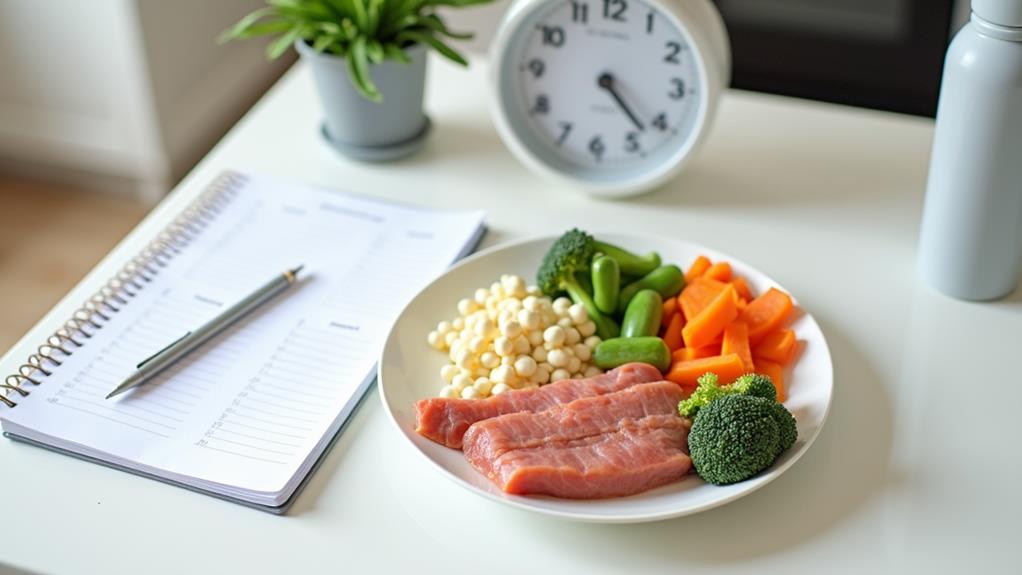
Now that you're prioritizing hydration to release your full potential in martial arts training, it's time to focus on the food that fuels your sessions. Effective meal planning is essential for peak performance.
Before training, aim to consume 5-8 grams of carbohydrates per kilogram of body weight to guarantee you have enough energy for high-intensity sessions. This will help you power through even the toughest training sessions.
After your workout, focus on a balanced meal containing 20-30 grams of protein and carbohydrates within 30-60 minutes to facilitate muscle recovery and replenish glycogen stores.
Don't forget to include healthy fats, which should comprise 20-35% of your total daily calories, to support hormone production and provide sustained energy during prolonged training sessions.
Adequate hydration is also critical, so consume 32-48 ounces of fluids for every kilogram lost during training and monitor your urine color to verify you're properly hydrated.
Incorporate a variety of nutrient-dense foods, including fruits and vegetables, to make sure you're getting enough vitamins and minerals to support overall health and recovery.
Supplements for Enhanced Performance
Supplements play an essential role in boosting martial arts performance, particularly for athletes over 40. As you age, your body's ability to recover from intense training sessions decreases, making supplements a vital addition to your nutrition plan.
| Supplement | Recommended Daily Dose |
|---|---|
| Omega-3 Fatty Acids | 1-2 grams |
| Creatine | 3-5 grams |
| BCAAs | 5-10 grams post-workout |
Omega-3 fatty acids reduce inflammation and support joint health, aiding recovery and maintaining mobility. Creatine supplementation supports explosive power and muscle mass, beneficial for combat sports athletes. BCAAs help reduce muscle soreness and promote recovery. Additionally, caffeine at 3-6 mg per kilogram of body weight improves focus and energy levels during training, providing a competitive edge. Beta-alanine enhances muscular endurance, allowing you to sustain high-intensity training sessions more effectively. With these supplements, you'll be able to optimize your martial arts performance, increasing your endurance, muscle mass, and overall recovery. By incorporating these supplements into your nutrition plan, you'll be able to maintain a high level of performance even after 40.
Weight Management for Martial Artists
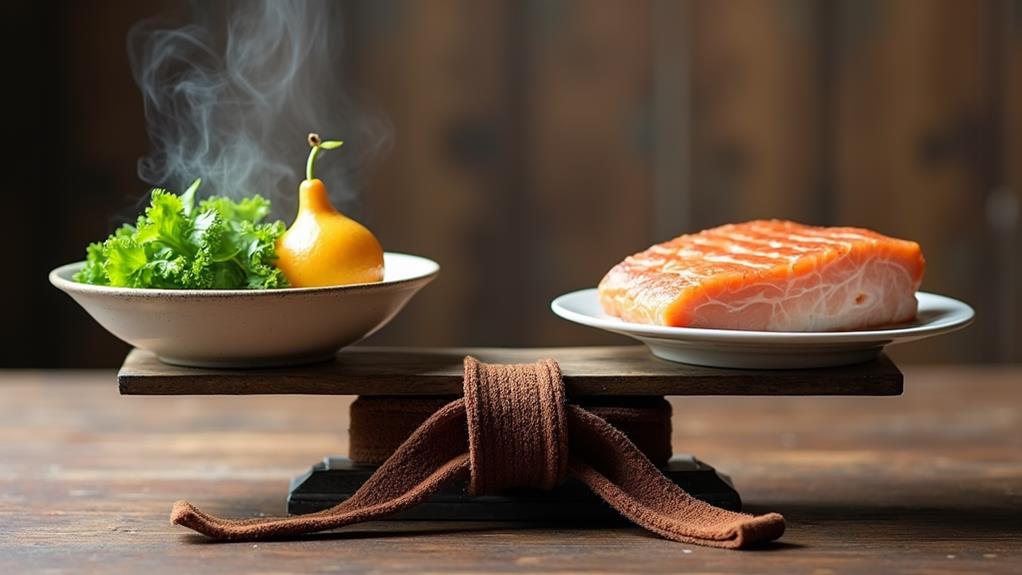
As a martial artist over 40, managing your weight is essential to maintaining peak performance. A balanced diet with a focus on macronutrient ratios is vital for efficient weight management. Aim for 60% carbohydrates, 25% fats, and 15% proteins to support your training and recovery.
When it comes to weight loss, opt for gradual methods, targeting no more than 0.5-1 kg per week. This approach will help you avoid muscle loss and maintain sustained energy levels.
Regularly monitoring your body composition will help you understand your fat-to-muscle ratio, enabling you to make tailored dietary adjustments for best performance. Focus on incorporating nutrient-dense foods, such as lean proteins and whole grains, to support muscle maintenance and recovery.
Don't forget to prioritize hydration strategies, including adequate fluids and electrolytes. Even 2% dehydration can impair performance and hinder effective weight management.
Nutrition Planning for Competition Day
Your weight management strategy is in place, and you've made significant progress in fine-tuning your diet for ideal martial arts performance.
Now, it's time to focus on nutrition planning for competition day. A well-structured meal plan is essential to enhance your performance and minimize health risks. Start with a balanced meal within an hour of waking, combining protein, carbohydrates, and healthy fats to sustain energy levels.
Two to three hours before the competition, consume a pre-fight meal with 60-90 grams of carbohydrates and 30 grams of protein, avoiding high-fat foods to aid digestion.
About an hour before the fight, take in approximately 1 gram of carbohydrates per kilogram of body weight for maximum energy availability. Opt for simple carbohydrates like powders, cereals, or drinks that digest quickly and reduce gastrointestinal discomfort.
Stick to your plan, as mismanaging meals on competition day can lead to significant performance reductions and health risks.


